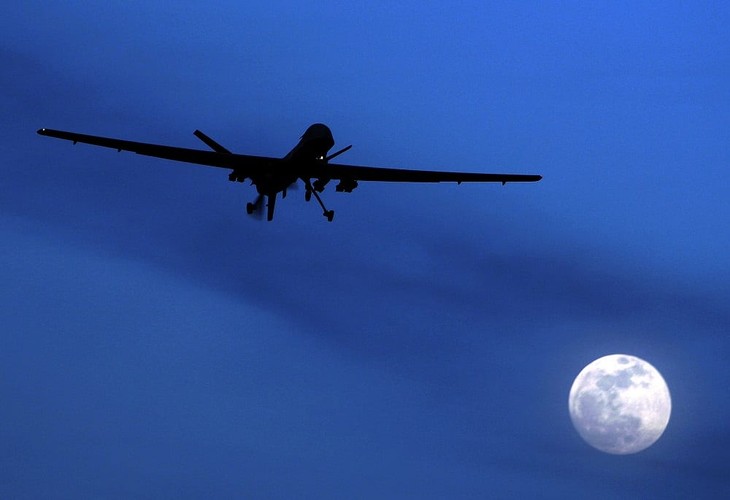The New York Times has obtained an unclassified version of the Biden White House’s drone strike and commando raid policy away from conventional battlefields. This policy prescribes how US forces may use drones and deploy US commandos to kill or capture high-value targets (HVT). In most cases, a strike requires the personal okay of Joe Biden, and there must be a “near certainty” that no civilians will be injured. These rules overturn a more permissive set of rules promulgated by President Trump.
How Does This Change Things?
According to “a senior administration official, speaking on the condition of anonymity to discuss sensitive security matters,” the new policy only recognizes Iraq and Syria as conventional battlefields. In the past, Afghanistan, Yemen, Libya, Somalia, and the Federally Administered Tribal Areas of Pakistan were considered areas of conflict.
This means that nearly all strikes by drones, Delta Force, or Navy SEALs will require Biden’s personal approval. In the past, lower-ranking officers were allowed to make calls. What it means, in fact, is that we will never authorize a strike or raid against a target not in Iraq or Syria because by the time Biden can be given enough methamphetamine to keep him lucid and briefed on the mission, the target will have disappeared.
There is a carve-out in the policy for
strikes carried out in defense of American forces stationed abroad or in the “collective self-defense” of partner forces trained and equipped by the United States. Such strikes are permitted in the cases of “foreign partners and allies who are under attack or are threatened with an imminent attack,” the document says.
This expands the area of decentralized drone use to include places like Somalia, where US-armed and trained Somali soldiers fight an Islamic insurgency.
Under President Trump, the standard for direct action was that “due care” be taken to prevent civilian casualties. Under the new system, your career is at risk if anything goes wrong. Like the rule on personal approval by Biden, this rule assures no strikes will be made.
The policy requires the Pentagon and CIA to publish annual reports quantifying the number of drone strikes and civilians killed and injured in those strikes. The Trump administration did not issue reports. Like the previous changes, this makes authorizing any strikes a high-risk, potential-prison-time affair and “do nothing” as the safest course of action. I think we’re seeing a pattern.
All terrorist risks to the US and its overseas installations must be prioritized “amid competing national-security threats and resource constraints.” Translated, this means that fighting terrorism has ceased to be a priority.
The Impact
Even without the new policy, drone strikes were out of favor with the Biden White House. The number of drone strikes dropped dramatically under President Trump due to winding down the war in Afghanistan, but they have cratered under Biden. In 2019 there were 224 strikes; in 2020, there were 56; and in 2021, there were 13. No numbers are available for 2022.
The policy only permits drone strikes in situations where drone operators “operators deem “infeasible” any option of capturing the targeted person alive in a commando raid.” I have no idea how a drone operator could make such a call or why anyone would take such a call made outside of a SOF planning cell as anything but laughable. We can take a moment, though, to examine what happens next. In Steven Coll’s book Ghost Wars, he described how the Clinton administration allowed itself to tie itself in knots and permit Osama bin Laden to live freely in an area where we had quite a bit of reach. Executive Order 12333, signed by Ronald Reagan, prohibits US involvement in assassination. The Clinton Administration determined that killing bin Laden would violate this order. So any plan to get bin Laden had to have a plausible way to capture and extract him from Afghanistan. Getting people to kill him was easy; the CIA was offered multiple chances to use in-country allies to do just that. What they could never develop was a plausible plan to get him out of Afghanistan. This will have much the same effect. Every potential hit will have to be studied to show that capture isn’t possible. By then, the target will have moved on.
This policy, on paper, would not have prevented the drone strike that wiped out an Afghan family, see That’ll Teach ‘Em. US Drone Strike Targeting Suicide Bombers in Kabul Kills Family of Nine, Including Four Kids Under Age Five. This is because US military forces were in the area, making it a “conventional battlefield” and under imminent threat of attack. In reality, it would have almost certainly stopped the drone strike because no one would take the risk of calling the shot. The follow-up attack against the “planner” of the suicide attack on US forces at the Kabul airport would probably never happened because it would have required presidential approval, see Biden Makes Good on Threat: US Airstrike Targets ISIS Member in Retaliation for Kabul Bombing.
Bottom Line
This policy basically ends the US war on international terrorism that began on September 11, 2001. It raises the bar so high for using drones that it will be nearly impossible to get the requisite permission in a timely manner. Before any drone attack can be ordered, a feasibility study has to determine that Delta or SEALs can’t capture and exfiltrate the target alive. The White House is in the kill chain.
We are back to where the Clinton White House was. You can be mostly opposed to drone strikes and still see how this is not a good thing.
The decision to honor a FOIA request for a classified document and provide experts to talk about it on background shows the Biden White House is sending a message to the world that it is no longer interested in keeping terrorist organizations from gaining the initiative.

